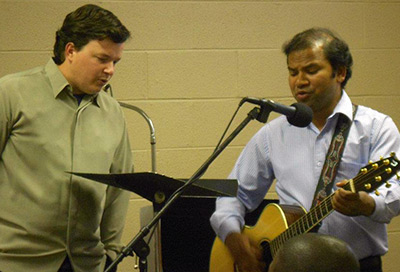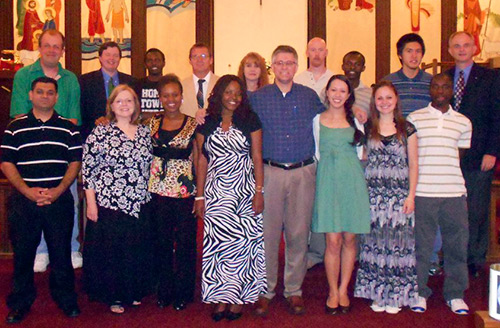In 2005, Jim Goodroe was on a quest. In his position as director of missions for Spartanburg County Baptist Network, he needed to find a replacement pastor for a Cambodian ministry.
 Derrick Smith (left) and Vijay Minz lead a Sunday-night worship service at Kaleidoscope Fellowship in Spartanburg.
Derrick Smith (left) and Vijay Minz lead a Sunday-night worship service at Kaleidoscope Fellowship in Spartanburg.He went to Dallas to attend an ethnic ministries summit in hopes he would find what he needed. “I did not find a single Cambodian at the summit,” said Goodroe, “but what I did learn about was multiethnic ministry, and [there] the Lord gave me the vision for Kaleidoscope Multiethnic Fellowship.”
With more than a few bumps and detours along the road, the church finally launched in 2009. The church could not take its first baby steps until it had at least three ethnicities represented in its leadership team.
Among the Caucasian members of Kaleidoscope, there is more than a tolerance for different cultures – there is a deep love and respect as well as a commitment to unity.
Kaleidoscope’s pastor is Derrick Smith, who is also a full-time teacher and small business owner who was raised in Spartanburg in a “typical church-life environment.”
“What most people don’t understand is that white American males don’t ever wake up thinking about their ethnicity or their race or their gender. They don’t ever wake up thinking, ‘Oh, no, I’m white,’ or ‘Oh, no, I’m male.’ They don’t think of it at all.
“When I was [studying abroad] in France, that was my first experience – oh, I’m an outsider. People looked at me differently, and it changed something in my brain. I’ve since traveled to India, Papua New Guinea, and places where white skin is strange. You’re stared at, and you start to get a feel for how people of color feel in the United States. There is something about that that makes you learn to feel for people.”
One of the factors that proved to be an obstacle to Kaleidoscope’s founding was the time frame. Most churches meet on Sunday morning, and Kaleidoscope originally intended to do the same. The dilemma was that internationals who were already believers were already involved in a church on Sunday morning.
“And we had the added factor that the large numbers of internationals who are college students tend to be out of town or in bed on Sunday morning,” said Goodroe. “Those factors led us to make Kaleidoscope a Sunday-night congregation. Once we did that, it allowed us to pick up several ethnicities on our leadership team.
“We may average about 30 in our congregation, but among them we will have eight ethnicities. Some activities will attract more than 100 people from 16 nations. Though our worship services are in English, we often have Scripture reading in many languages. Our songs will be interspersed with other languages as well.
“Matthew 13 is a chapter where Jesus gives parables about the kingdom of heaven. In one of those, he says, ‘The kingdom of heaven is like a dragnet which, when cast into the sea, brings forth all kinds of fish.’ Much of evangelism or mission work is like casting a rod and reel where you are targeting one type of fish. We are to be fishers of men. Multiethnic work is more like a dragnet. You throw it out there and you don’t know who you are going to get. So it has been an interesting and broadening experience for me.”
Pastor Smith has a burden to see change in U.S. churches. “The American church has to change or die,” he said. “You’ve seen the demographics and statistics that show white people will cease to be the majority by the year 2038. They will still be the biggest plurality, but the church has to prepare for that. The multiethnic church is the way to do it.
“It is obedient to the Great Commission. If you are making disciples of all nations, all nations will be among you. In a nutshell, it is the difference between an assimilating church and an accommodating church.
“There are many churches in South Carolina that would love to assimilate people who are different into themselves. They would say, ‘You are welcome here. Come, and you do things this way. This is how we do them and you can stick around.’
 “If you are different, then come in, and we will all learn to change together,” says pastor Derrick Smith of the multiethnic Kaleidoscope Fellowship.
“If you are different, then come in, and we will all learn to change together,” says pastor Derrick Smith of the multiethnic Kaleidoscope Fellowship.“But in an accommodating church, the attitude is different. It says we’re all different. ‘If you are different, then come in, and we will all learn to change together.’ That’s what we are trying to do. It is slow and it’s hard, but it’s our call and we have to do it.”
That accommodating spirit is part of the reason Casey Burnett and his wife, Judith, were drawn to the congregation. In his travels with his ministry, Cup of Hope, Burnett met his wife in the Philippines. They are now ministry partners.
“My wife and I got used to small-group worship while we were in the Philippines,” Burnett said. “When I came back to Spartanburg, it was hard to adjust to a large and monoethnic church. Since we are a multiethnic couple, we fit in really well in a small church with nine ethnicities. Half of them have immigration problems just like us. We have community.”
When God gave John a glimpse of the future, he described it in part in Revelation 7:9-10: “After these things I looked, and behold, a great multitude which no one could count, from every nation and all tribes and peoples and tongues, were standing before the throne and before the Lamb, clothed in white robes, and palm branches were in their hands; and they cried out with a loud voice, saying, ‘Salvation to our God who sits on the throne, and to the Lamb’?” (NASB).
One day, believers everywhere will worship God with a unity that disregards any ethnic differences.
Multiethnic churches like Kaleidoscope are leading the way. – SCBC